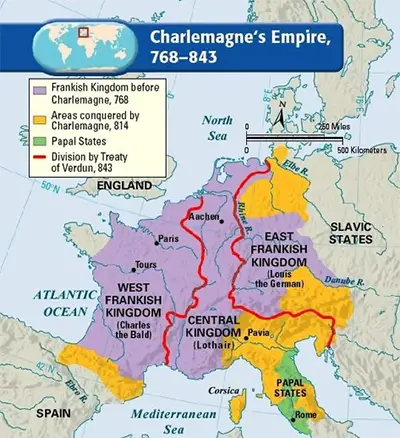Charlemagne
Part 3: Head of a Large Empire Charlemagne proved an adept diplomat, cementing alliances with a number of other key rulers. To the capital of Aachen each year he called a general assembly. They had a merely advisory role because as king, Charlemagne was the head of the legislature, the judiciary, the church, and the army. He set about shoring up administration throughout his realm, instituting standard weights and measures and codifying customs duties. He introduced new accounting methods and established a new standard currency, the livre carolinenne, which was basically a pound of silver. He also sent out large numbers of commissioners, who traveled to local areas in order to enforce his decrees. Out in the lands at large, he encouraged technological and other kinds of advancement, such as the use of crop rotation, shared labor between farms, a new kind of plow that reduced labor and improved yield, and the water mill as a means of grinding grain (replacing human hands). Charlemagne, an avid reader, led a drive to improve literacy and education throughout the realm. (This made it all the easier for local officials to understand the king's written instructions that he sent out on a regular basis.) Scholars copied most of the surviving works of classical Latin. Alcuin, the famous scholar from Brittania, had come in 780 to found a school at Aachen. Another well-known scholar, Theodulf of Orléans, also worked under Charlemagne. A devout Christian religion, the king promoted the regular study of that religion as well, standardizing liturgical practices and reinforcing Christian doctrine with his political will and power. He required his subjects to be baptized as Christians in the same way that he required them to swear an oath of loyalty to him. 
At its height, the land controlled by Charlemagne included all or parts of what is now Austria, Belgium, France, Germany, Italy, the Netherlands, Spain, and Switzerland. In 781, Charlemagne named his three younger sons kings. Charles (the Younger) became King of the Franks, Louis became King of Aquitaine, and Carloman (whom Charlemagne renamed Pepin) became King of Italy. In this way, Charlemagne could share power and also give his sons valuable experience in ruling a land and its people. Conversely, Charlemagne refused to allow his daughters to marry while he was alive. Hildegard died in 783, and Charlemagne married again, to Fastrada, the daughter of a Frankish count; she died in 794. Later that year, he married an Alamannian woman named Luitgard; she died in 800. When Charlemagne died, in 814, he had one surviving son, Louis, who inherited the entire kingdom. He became known as Louis the Pious because of his preference for religion and study and not military prowess. First page > Rise to Power > Page 1, 2, 3 |
|
Social Studies for Kids
copyright 2002–2026
David White




